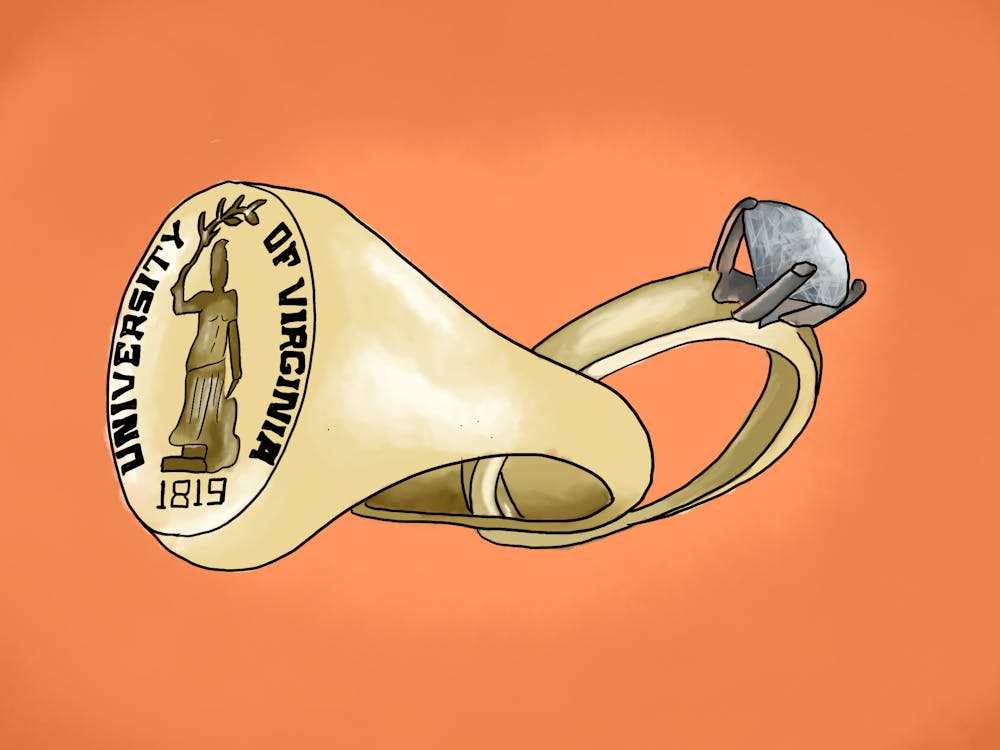With midterms sweeping Grounds — the scariest thing since a drunk fraternity
pledge riding a Veo scooter at max speed zoomed past you at three in the morning — students across the University are scrambling to finish their final essays and end the first half of fall semester with “As” in the gradebook. If you are one of the many students struggling to churn out a passable product in a timely fashion and seem to be getting stuck with your work at every turn, have no fear! Special guest Abigail Shrier came to Grounds Oct. 11 — the “journalist” modeled a few key methods to establish an argument and produce a project that is sure to get you good enough grades that your parents will keep paying your tuition.
Tip Number One — Repetition, Repetition, Repetition!
As we all know, word count requirements can ruin what would otherwise be the simplest of
essays. You think you are done, you’ve made an argument with all the intricacy you can manage, but then you realize you are only halfway to the word count! Not to worry, with the excessively padded length of her Wednesday night program as well as book, Irreversible Damage, Shrier shows us all a key step for successful writing — repeat the same points over, and over, and over again!
Creating a solid thesis is the first step in putting together any essay, which is why using slightly different wording and duplicating your thesis ad nauseam — without adding any additional evidence — is the perfect way to beef up the word count without the effort it would normally take to engage in intellectual discourse. In addition, this method can work for any other pieces of your own writing or the evidence you use to support yourself. Simply pick out which points you would like to repeat, continue adding them back into the piece, set aside any desire to say anything of even marginal value and watch as you reach your word count in no time at all!
Tip Number Two — You’re the Expert!
No matter what, confidence is key. Nothing anchors an essay together like a complete and
blinding trust in your abilities, even when you have zero qualifications to speak on your chosen topic. Just like Shrier showed us, the bottom line of any project is that research and expertise are for schmucks. Why spend years achieving academic excellence when a quick reaffirmation of faith in yourself can blow the so-called “experts” out of the water? As long as you have a platform to share your essay’s message and a captive audience — whether it be your professor, a study group or a lecture hall full of University donors — your emboldened belief that you can speak eloquently on the subject trumps all else. The National Institute of Health, American Academy of Pediatrics and the University’s own faculty are just some of the higher-ups Shrier showed us how to disregard whenever it benefits you, setting a powerful example for anyone looking for an essay life line.
Tip Number Three — Make It Up!
The last and most versatile of the concepts Shrier illustrated during her interview and subsequent question and answer was harnessing the power of your own imagination. No matter what your essay topic is, completely making it up is a simple and effective way to bolster your argument’s credibility. For the more STEM inclined, you can make up statistics or scientific journal findings that support your own research. For the literature aficionados that can’t find textual evidence to support their thesis, make up a quote from the book — it’s not like your professor has the whole thing memorized! For the history-minded crowd that needs to back up an argument with specific events, make up a few historical battles or notable figures to sprinkle here and there. Whether you are a student in the College of Arts and Sciences, the School of Engineering or anywhere in between, the world is your oyster — as long as you harness Shrier’s awe-inspiring power to imagine a world that simply does not exist. Oh, and when the time comes to cite your sources, you guessed it — make those up too!
If these three methods are not enough to save you some midterm stress, don’t fret! For more helpful hints and in-depth examples of how to take the hassle out of writing your academic papers, check out Shrier’s “book,” “Irreversible Damage,” and learn from one of the best in the corner-cutting business.





